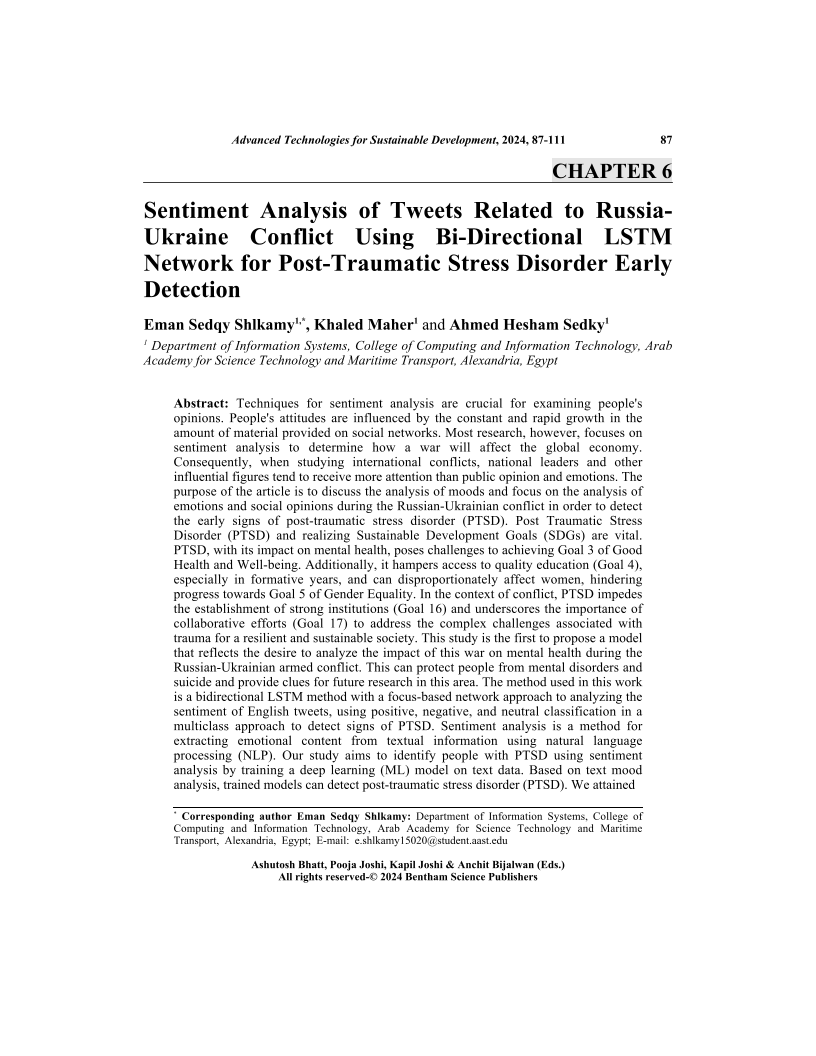Sentiment Analysis of Tweets Related to RussiaUkraine Conflict Using Bi-Directional LSTM Network for Post-Traumatic Stress Disorder Early Detection

- Authors: Eman Sedqy Shlkamy1, Khaled Maher2, Ahmed Hesham Sedky3
-
View Affiliations Hide Affiliations1 Department of Information Systems, College of Computing and Information Technology, Arab Academy for Science Technology and Maritime Transport, Alexandria, Egypt 2 Department of Information Systems, College of Computing and Information Technology, Arab Academy for Science Technology and Maritime Transport, Alexandria, Egypt 3 Department of Information Systems, College of Computing and Information Technology, Arab Academy for Science Technology and Maritime Transport, Alexandria, Egypt
- Source: Advanced Technologies for Realizing Sustainable Development Goals: 5G, AI, Big Data, Blockchain, and Industry 4.0 Application , pp 87-111
- Publication Date: October 2024
- Language: English
Sentiment Analysis of Tweets Related to RussiaUkraine Conflict Using Bi-Directional LSTM Network for Post-Traumatic Stress Disorder Early Detection, Page 1 of 1
< Previous page | Next page > /docserver/preview/fulltext/9789815256680/chapter-6-1.gif
Techniques for sentiment analysis are crucial for examining people's opinions. People's attitudes are influenced by the constant and rapid growth in the amount of material provided on social networks. Most research, however, focuses on sentiment analysis to determine how a war will affect the global economy. Consequently, when studying international conflicts, national leaders and other influential figures tend to receive more attention than public opinion and emotions. The purpose of the article is to discuss the analysis of moods and focus on the analysis of emotions and social opinions during the Russian-Ukrainian conflict in order to detect the early signs of post-traumatic stress disorder (PTSD). Post Traumatic Stress Disorder (PTSD) and realizing Sustainable Development Goals (SDGs) are vital. PTSD, with its impact on mental health, poses challenges to achieving Goal 3 of Good Health and Well-being. Additionally, it hampers access to quality education (Goal 4), especially in formative years, and can disproportionately affect women, hindering progress towards Goal 5 of Gender Equality. In the context of conflict, PTSD impedes the establishment of strong institutions (Goal 16) and underscores the importance of collaborative efforts (Goal 17) to address the complex challenges associated with trauma for a resilient and sustainable society. This study is the first to propose a model that reflects the desire to analyze the impact of this war on mental health during the Russian-Ukrainian armed conflict. This can protect people from mental disorders and suicide and provide clues for future research in this area. The method used in this work is a bidirectional LSTM method with a focus-based network approach to analyzing the sentiment of English tweets, using positive, negative, and neutral classification in a multiclass approach to detect signs of PTSD. Sentiment analysis is a method for extracting emotional content from textual information using natural language processing (NLP). Our study aims to identify people with PTSD using sentiment analysis by training a deep learning (ML) model on text data. Based on text mood analysis, trained models can detect post-traumatic stress disorder (PTSD). We attained a 90.02% accuracy by combining the attentional mechanism with a bidirectional shortterm memory layer (Bi-LSTM). The findings of the suggested framework demonstrate greater accuracy than earlier state-of-the-art investigations. By creating an early detection model, post-traumatic stress disorder (PTSD) symptoms may be lessened.
-
From This Site
/content/books/9789815256680.chapter-6dcterms_subject,pub_keyword-contentType:Journal -contentType:Figure -contentType:Table -contentType:SupplementaryData105

